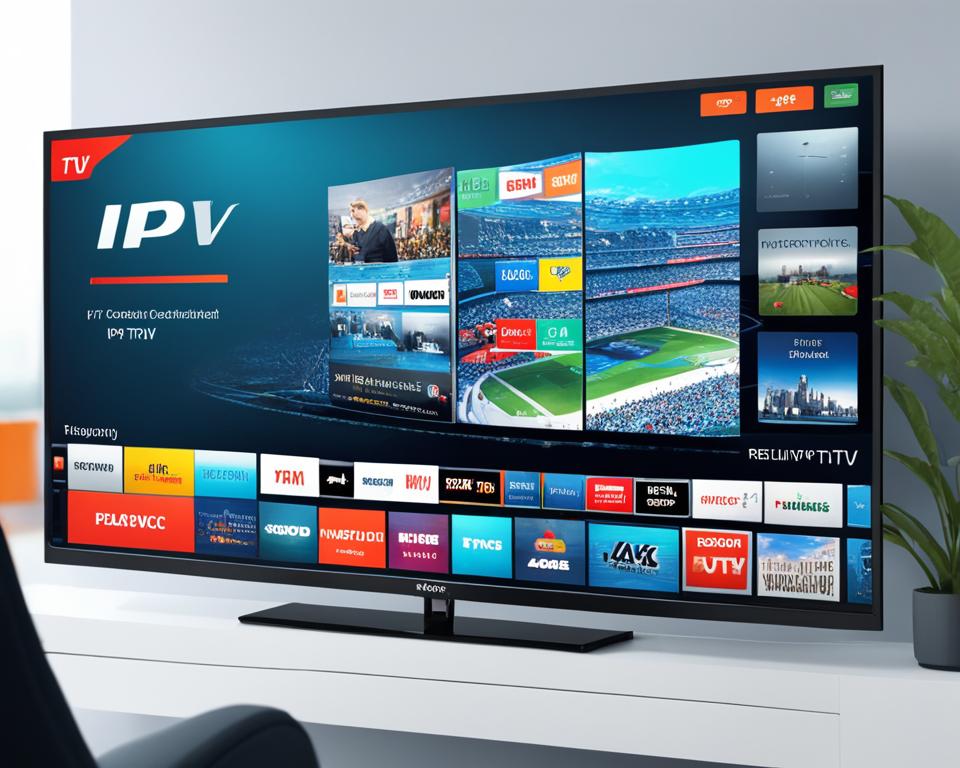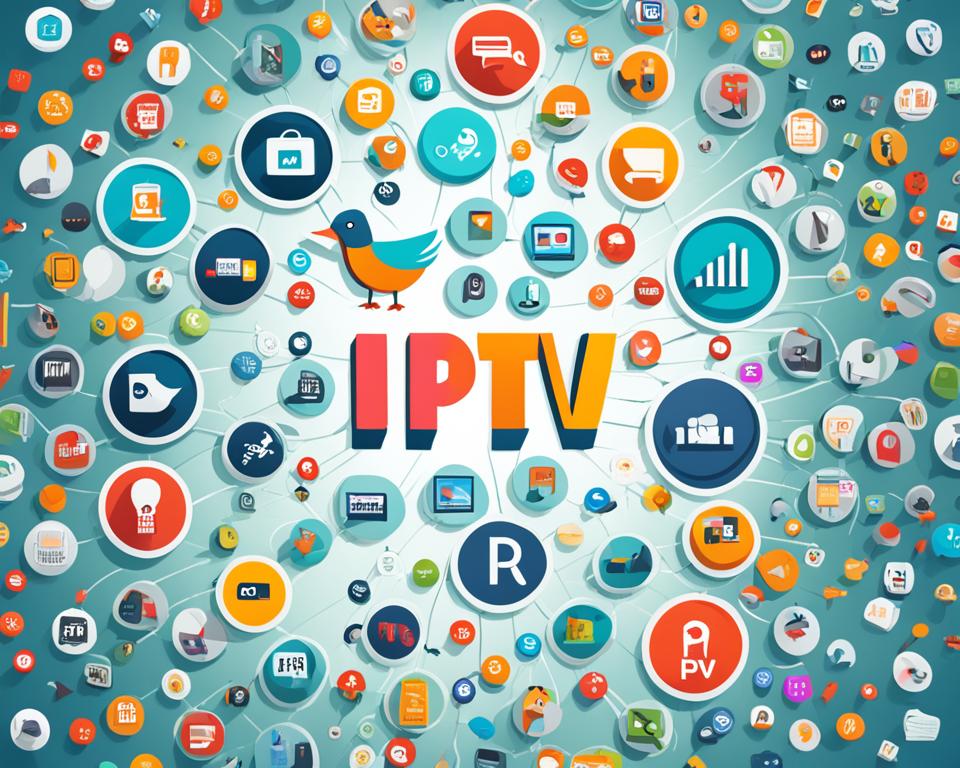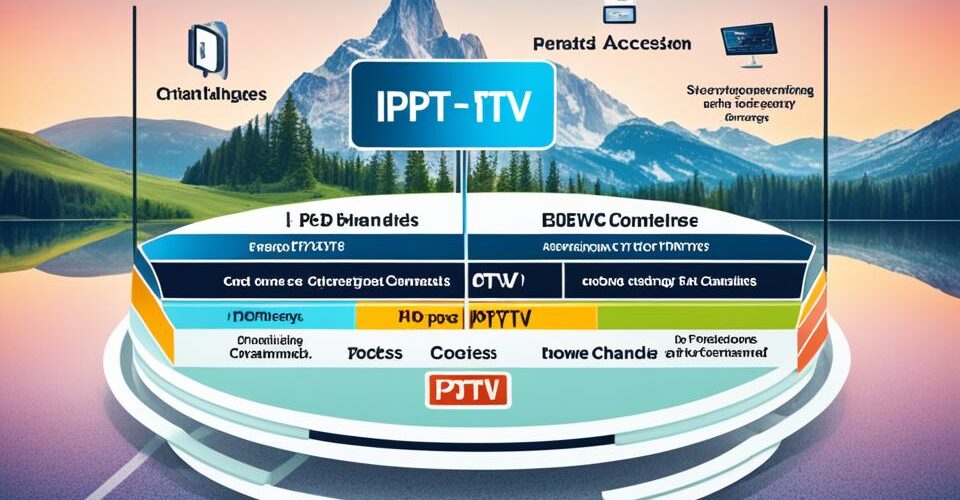Did you know that the global IPTV market is expected to reach a whopping $117.07 billion by 2027?1 With the rise of internet technology, IPTV has become a popular choice for TV viewers looking for more control over their viewing experience. But is it really worth your time and money? In this comprehensive evaluation, we will delve into the world of IPTV and explore its features, benefits, drawbacks, and how it compares to traditional TV services.
Key Takeaways:
- IPTV is a digital television broadcasting system that delivers content over the internet.
- It offers cost savings, flexibility, and a wider variety of content compared to traditional TV services.
- Buffering issues, limited channel selection, and security risks are some of the drawbacks to consider.
- When choosing an IPTV service provider, consider factors such as channel selection, service quality, compatibility, and price.
- The market for IPTV is growing rapidly, with key players leading the industry with innovative services and technologies.
Now, let’s dig deeper into the world of IPTV and determine whether it’s the right choice for you!
1. Grand View Research. (2020). IPTV Market Size, Share & Trends Analysis Report By Subscription Type (Subscription-based, Subscription Free), By Region (North America, Europe, APAC, South America, MEA), And Segment Forecasts, 2020 – 2027
What is IPTV?
IPTV stands for Internet Protocol Television, a digital television broadcasting system that offers a new way to access television content over the internet. It utilizes IP networks to transmit video streams, providing users with a wide variety of channels and content options.
IPTV is transforming the television landscape by offering viewers a more interactive and personalized viewing experience. Unlike traditional cable and satellite TV services, IPTV uses the internet to deliver television content, enabling users to watch their favorite shows and movies on various devices, such as Smart TVs, smartphones, tablets, and computers. With IPTV, viewers have the flexibility to access content on-demand, customize their viewing experience, and enjoy features like pausing and rewinding live TV.
One of the key features of IPTV is its ability to offer a diverse range of channels and content options. Users can access live TV, catch-up TV, and on-demand content, giving them the freedom to watch what they want, when they want. This expansive channel selection includes international channels and niche programming that may not be available on traditional cable.
IPTV Features:
- Wide range of channels, including live TV, catch-up TV, and on-demand content.
- Access to international channels and niche programming.
- Flexibility to watch on various devices (Smart TVs, smartphones, tablets, and computers).
- Interactive and personalized viewing experience.
- Ability to customize viewing preferences and enjoy features like pausing and rewinding live TV.
IPTV provides an innovative and convenient way for viewers to access television content. Whether you’re catching up on your favorite shows, watching live sports, or exploring new content, IPTV offers the flexibility and features to enhance your viewing experience.
The Benefits of IPTV
IPTV offers several benefits that make it an attractive option for many viewers. One of the biggest advantages is the cost savings. Unlike traditional cable services, IPTV allows users to choose from a variety of packages and only pay for the channels they want to watch, resulting in significant savings.
Additionally, IPTV offers flexibility in terms of when and where you can watch your favorite content. You can enjoy on-demand streaming and watch shows at your convenience, eliminating the need to stick to fixed schedules.
IPTV also provides a wider variety of content, including international channels and niche programming that may not be available on traditional cable. This ensures that viewers have access to a diverse range of entertainment options to cater to their specific interests and preferences.

Overall, the benefits of IPTV, including cost savings, flexibility, and diverse content options, make it a compelling choice for viewers looking for a modern and customizable TV experience.
The Drawbacks of IPTV
While IPTV offers numerous advantages, such as cost savings, flexibility, and a wide range of content options, there are also some drawbacks that need to be considered. These drawbacks include buffering issues, limitations in channel availability, and potential security risks.
Buffering Issues
One of the common issues with IPTV is buffering, which can disrupt the viewing experience and lead to frustration for users. Buffering occurs when the video playback is temporarily paused to allow for data to be loaded and stored in the buffer. This can happen due to slow internet connections, high demand on the streaming service, or congestion in the network. When buffering takes place frequently or for extended periods, it can significantly impact the enjoyment of watching content.
Limitations in Channel Availability
Another drawback of IPTV is that some providers may have limited channels available in their lineup. While there is a wide variety of channels to choose from in the IPTV market, specific channels or programs that viewers are interested in may not be offered by certain providers. This can be particularly disappointing if viewers have specific preferences or favorite channels that they are unable to access through their IPTV service.
Security Risks
Using IPTV services from unreliable sources can pose security risks, including the potential for malware or viruses. It is crucial to choose reputable service providers to ensure a safe and secure viewing experience. Reliable providers implement security measures to protect users from potential threats, but accessing IPTV content from unreliable sources or unauthorized platforms can increase the risk of compromising personal information or devices.
Drawbacks of IPTV
| Drawbacks | Description |
|---|---|
| Buffering Issues | Interruptions in the viewing experience due to buffering, caused by slow internet connection or high demand on the streaming service |
| Limitations in Channel Availability | Some providers may not offer certain channels or programs, limiting the variety of content available |
| Security Risks | Using unreliable sources for IPTV services can pose a risk of malware or viruses |
It is important to keep these drawbacks in mind when evaluating whether IPTV is worth your time and money. While IPTV offers many benefits, understanding and considering its limitations can help you make an informed decision.
IPTV vs. Traditional TV Services
When considering whether IPTV is worth your time and money, it is essential to compare it to traditional TV services. IPTV offers several advantages over traditional cable and satellite TV, including cost savings, flexibility, and a wider variety of content.
Unlike cable and satellite TV, IPTV allows viewers to choose their channels and only pay for what they want to watch, eliminating the need for expensive cable packages. This provides cost savings for users who prefer a more customized channel lineup.
IPTV also offers on-demand streaming, allowing viewers to watch shows at their convenience. With traditional TV services, viewers are limited to fixed schedules and may miss out on their favorite shows if they are not available during those specific times. IPTV eliminates this inconvenience by providing the flexibility to watch content whenever it suits the viewer.
Furthermore, IPTV provides access to international channels and niche programming that may not be available on traditional TV. This widens the range of content options, catering to diverse interests and preferences. Whether you enjoy foreign films, sports events from around the world, or specialized programming, IPTV offers a broader selection of content to choose from.
However, it is important to note that traditional TV services may still have advantages in terms of reliability and familiarity for some viewers. Cable and satellite TV have been around for a long time and are well-established in many households. Some viewers may prefer the simplicity and stability of traditional TV services, especially if they are not interested in exploring new technologies.
Overall, deciding between IPTV and traditional TV services comes down to your priorities and preferences. If you value cost savings, flexibility, and a wider variety of content, IPTV may be the better choice for you. However, if you prioritize reliability and familiarity, sticking with traditional TV services might be the right decision.

| IPTV | Traditional TV | |
|---|---|---|
| Cost | IPTV allows viewers to choose and pay for specific channels, potentially resulting in cost savings. | Traditional TV services often require users to pay for bundled packages, which may include channels they don’t watch. |
| Flexibility | IPTV offers on-demand streaming, allowing viewers to watch shows at their convenience. | Traditional TV services have fixed schedules, requiring viewers to adhere to specific broadcast times. |
| Content Variety | IPTV provides access to international channels and niche programming that may not be available on traditional TV. | Traditional TV services may have limited channel options, with fewer specialized content offerings. |
| Reliability | IPTV streaming quality and reliability can be affected by internet connection issues and high demand on the service. | Traditional TV services are generally more reliable, with less dependence on internet connectivity. |
How to Choose the Right IPTV Service Provider
When it comes to IPTV, selecting the right service provider is essential. To ensure you make an informed decision, consider the following factors:
- Channel selection: Choose a service provider that offers a wide range of channels that align with your viewing preferences. Whether you enjoy sports, movies, or international content, ensure the provider has the right channels for you.
- Quality of service: Before committing to a provider, check reviews and customer feedback to determine if they offer a reliable service with minimal downtime. Look for providers with a good track record of delivering high-quality streaming experiences.
- Compatibility: Ensure that the IPTV service is compatible with your devices, such as Smart TVs, smartphones, and tablets. Verify that the provider offers dedicated apps or supports popular streaming platforms.
- Price: Compare the pricing of different providers to ensure you get the best value for your money. Take into account the channel selection, features, and overall service quality when considering the cost.
By carefully evaluating these factors, you can choose an IPTV service provider that meets your needs, provides a quality viewing experience, and offers the channels and features you desire.
A Comparison of IPTV Service Providers
| Service Provider | Channel Selection | Quality of Service | Compatibility | Price |
|---|---|---|---|---|
| Provider A | 300+ | ⭐⭐⭐ | Smart TVs, smartphones, tablets | $20/month |
| Provider B | 500+ | ⭐⭐⭐⭐ | Smart TVs, smartphones, tablets, Fire TV Stick | $25/month |
| Provider C | 200+ | ⭐⭐ | Smart TVs, smartphones | $15/month |
Quote:
“Choosing the right IPTV service provider is crucial for a seamless and satisfying streaming experience. It’s important to consider factors such as channel selection, service quality, device compatibility, and pricing.”
IPTV Market overview and Key Players
The IPTV market is experiencing significant growth, driven by the increasing demand for television content delivered through the internet. This market is expected to continue growing at a steady rate, offering more options and competition for viewers. With the convenience and flexibility provided by IPTV services, more and more people are turning to this alternative form of TV entertainment.
Key players in the IPTV market are leading the industry with their innovative services and technologies, catering to the evolving needs of viewers. These players include:
- Tripleplay Services Ltd.
- AT&T Inc.
- Ericsson AB
- Verizon Communications
- Huawei Technologies Co., Ltd.
These industry giants are at the forefront of providing high-quality IPTV services and are continuously pushing the boundaries of what is possible in the IPTV market. Their offerings include a wide range of channels, on-demand content, and exciting features to enhance the viewing experience.
To stay informed about the latest developments and offerings from these key players, it is crucial for viewers to keep an eye on the IPTV market. By staying updated, viewers can make informed decisions about the best IPTV services for their needs and preferences.

| Key Players | Features and Advantages |
|---|---|
| Tripleplay Services Ltd. | Wide range of international channels, on-demand content, and advanced features. |
| AT&T Inc. | Integrated IPTV and internet services, seamless streaming on multiple devices. |
| Ericsson AB | High-quality video delivery, personalized recommendations, and interactive features. |
| Verizon Communications | Robust IPTV platform, diverse channel lineup, and advanced DVR capabilities. |
| Huawei Technologies Co., Ltd. | End-to-end IPTV solutions, exceptional video quality, and seamless integration with other services. |
How IPTV Streaming Devices Enhance the Viewing Experience
IPTV streaming devices play a crucial role in enhancing the viewing experience for IPTV users. These devices provide a hassle-free way to access and enjoy IPTV content on various devices, such as Smart TVs, smartphones, tablets, and laptops. They offer features like built-in Wi-Fi for easy connectivity, high-resolution streaming for crisp and clear picture quality, and support for multiple apps and services. With IPTV streaming devices, users can have a seamless and convenient viewing experience, enabling them to enjoy their favorite shows and movies anytime and anywhere.
One of the key benefits of IPTV streaming devices is their ability to provide reliable and high-quality streaming. These devices are designed to deliver smooth and uninterrupted streaming, ensuring that users can enjoy their content without buffering or interruptions. Built-in Wi-Fi capabilities allow for easy and stable connectivity, enabling users to stream their favorite shows and movies seamlessly.
Furthermore, IPTV streaming devices offer support for a wide range of apps and services, allowing users to customize their viewing experience. They provide access to popular streaming platforms like Netflix, Hulu, and Amazon Prime Video, as well as IPTV-specific apps that offer a vast selection of channels and on-demand content. This versatility ensures that users have a wide variety of options to choose from, catering to their individual preferences and interests.
In addition to these features, IPTV streaming devices also support high-resolution streaming, providing users with an immersive and visually stunning viewing experience. This is particularly beneficial for users who own Smart TVs or devices with 4K resolution capabilities, as they can enjoy their IPTV content in stunning detail and clarity.
IPTV streaming devices also offer user-friendly interfaces and intuitive navigation, making it easy for users to browse and access their favorite content. They often come with remote controls or mobile apps that allow for seamless control and navigation, ensuring a smooth and user-friendly viewing experience.
Popular IPTV streaming devices include the Amazon Fire TV Stick, Roku Streaming Stick, Nvidia Shield TV, and Apple TV 4K. These devices have gained popularity among IPTV users due to their reliability, performance, and wide range of features.
Overall, IPTV streaming devices enhance the viewing experience by providing reliable and high-quality streaming, support for multiple apps and services, and intuitive navigation. Whether you’re watching on a Smart TV, smartphone, tablet, or laptop, these devices ensure that you can enjoy your favorite shows and movies with ease and convenience.
| Pros | Cons |
|---|---|
| Reliable and high-quality streaming | Potential for buffering issues |
| Support for multiple apps and services | Need to choose a reputable device and service provider |
| User-friendly interfaces and intuitive navigation | Additional cost for purchasing the device |
| High-resolution streaming for enhanced visual experience | Dependent on internet connection speed |
| Convenient and seamless access to IPTV content | Limited to devices with internet connectivity |
Conclusion
After a comprehensive evaluation of IPTV, it is clear that this innovative technology offers numerous benefits and advantages over traditional cable and satellite TV services. The cost savings, flexibility, and wide range of content options make IPTV an attractive choice for viewers seeking a more personalized and convenient viewing experience.
By choosing IPTV, viewers can enjoy the convenience of watching their favorite shows and movies at their own convenience, without being tied to fixed schedules. The on-demand streaming and customization features allow for a more tailored and interactive viewing experience, enhancing viewer satisfaction. Additionally, IPTV provides access to a diverse range of channels, including international and niche programming, which may not be available on traditional TV services.
However, it is important to consider the drawbacks and limitations of IPTV. Buffering issues, which can occur due to internet connection problems or high demand, may interrupt the viewing experience and cause frustration. To mitigate this, it is crucial to choose a reputable IPTV service provider that offers a reliable and high-quality streaming experience. Additionally, viewers should be cautious of using IPTV services from unreliable sources to avoid potential risks of malware or viruses.
In conclusion, the decision of whether IPTV is worth it will ultimately depend on individual preferences and priorities. By evaluating the features, benefits, drawbacks, and comparing it to traditional TV services, viewers can make an informed decision. Considering factors such as cost, convenience, and content options will help viewers determine if IPTV aligns with their needs and if it is worth their time and money.



